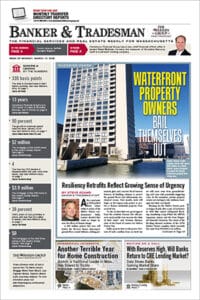Boston city councilors Wednesday afternoon approved a three-year increase in commercial properties’ share of property taxes starting in 2025 while adding programs designed to cushion the effects on small businesses.
“This is a short-term solution as we navigate and figure out how to do the long-term work,” Council President Ruthzee Louijeune said, referring to a search for alternate revenue sources to replace declining commercial values.
The tax shift increases the maximum shift between commercial and residential tax rates to 181.5 percent in 2025, returning in steps to the current 175 percent shift in 2028.
Councilor Ed Flynn cast the lone vote against the home rule petition, which now goes to the state Legislature for approval.
Compromised Paved Way for Vote
Mayor Michelle Wu has argued the changes are needed to avert a steep increase in residential property taxes starting in January and to maintain municipal services. Business and real estate industry groups criticized placing a larger portion of the city’s tax levy on commercial properties and urged spending cuts instead.
Over the summer, state Senate leadership resisted approving an earlier version of Boston’s home rule petition, which like Wednesday’s version gave the city the ability to approve a bigger differential between residential and commercial tax rates than the maximum allowed under state law. Senate President Karen Spilka said she shared the business groups’ concerns about the financial burden.
The administration and the Greater Boston Chamber of Commerce, Massachusetts Taxpayers Foundation, NAIOP-Massachusetts and the Boston Municipal Research Bureau reached a compromise early last week.
At a hearing Tuesday, Flynn pressed Chief Financial Officer Ashley Groffenberger on options for spending cuts, including school transportation costs.
“How are we going to address that figure: $170 million for a [Boston Public Schools] transportation system that is not succeeding? We’re spending money we shouldn’t be spending, and that is a lot of money for taxpayers,” Flynn said.
How Deal Will Affect Landowners
The maximum differential between commercial and residential tax rates would rise from 175 to 181.5 percent starting in fiscal 2025, declining to 180 and 178 percent in ensuing years before returning to the historical norm.
The mayor’s office presented data this month indicating that the average residential tax bill would rise $273 if the previous proposal were approved.
A commercial property valued at $5 million would pay $117,936 in fiscal 2025 under the current system, and $125,671 if the larger tax shift is adopted, according to the previous estimates, representing a 6.7 and 0.5 percent decrease from the previous year respectively.
An updated estimate of the compromise proposal’s effects on average tax bills has not been completed, Wu spokesperson Emma Pettit said Tuesday, pending updated assessment data.
The final version reduced a five-year shift in the tax differential to three years, while adding small business relief measures.
The personal property tax exemption, which currently applies to the first $10,000 of assessed value, would rise to $30,000. The bill also includes $15 million that would be available for small businesses with less than $5 million in annual revenues or 50 employees.
Raising the personal property tax would exempt approximately 4,700 small businesses, or about half of those currently paying the tax, up from approximately 2,000, Groffenberger said.
“This is direct relief to the businesses regardless of whether they own the spaces they occupy,” she said.
Some in Biz Community Opposed
At Tuesday’s hearing, members of the Massachusetts Senior Action Council spoke in support of Wu’s proposal, saying property taxes are already burdensome due to escalating home prices in recent years.
The Small Property Owners Association criticized the compromise version Tuesday.
“This tax shift is a case of adding insult to injury. Mayor Wu’s plan is to turn to the most beleaguered sector, commercial real estate, to make up the difference in her overly bloated budget,” the landlord group’s statement said.
Marty Walz, interim president of the Boston Municipal Research Bureau and one of the four top business leaders that crafted the deal councilors passed Wednesday, said Boston needs to reexamine its approach to tax revenues to reflect a long-term decline in commercial property values.
“The new market dynamic for commercial real estate is not a temporary or cyclical change, which means the city and all of us must grapple with the implications for the long term through responsible approaches to budgeting,” Walz said.









